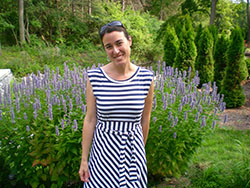Artist Interview: Takács Quartet Violinist Ed Dusinberre
On October 6, 2016, Takács Quartet volinist Ed Dusinberre was interviewed by U-M Professor of Musicology Steve Whiting at Literati Bookstore in Ann Arbor.
Takács Quartet performs the complete Beethoven Quartet Cycle during the 2016-17 at UMS, a tour in conjunction with the release of Dusinberre’s new book Beethoven for a Later Age: The Journey of a String Quartet.
Takács Quartet performs October 8-9, 2016 and January 21-22, March 25-26, 2017 in Ann Arbor.
UMS Artists in Residence: Meet Helena Mesa
Editor’s note: UMS is in the second season of its Artists in “Residence” program. Five residents from across disciplines take residence at our performances throughout our season. We’ll profile each resident here on UMS Lobby.
Helena Mesa is the author of Horse Dance Underwater and a co-editor for Mentor & Muse: Essays from Poets to Poets. Her poems have appeared in various literary journals, including Indiana Review, Pleiades, Third Coast, and Puerto del Sol. She has been a fellow at the Virginia Center for the Creative Arts, Hambidge Center for the Creative Arts & Sciences, and Writers in the Heartland. She lives in Ann Arbor and teaches at Albion College.
UMS: Tell us a little about yourself and your background in the arts.
 Helena Mesa: When I was a senior in High School, I secretly wrote poems on my sister’s computer, but I didn’t know they were poems until I took my first creative writing class in college. One of the assignments was to go to the local bookstore, choose a poetry collection, and write a response. I read Yusef Komunyakaa’s Dien Cai Dau and fell in love. Since then, I’ve been reading and writing poetry, thinking about the power of compressed language, a restrained narrative, and image. At first, my poetic study was unfocused, but eventually, I attended graduate school in Maryland and Texas, which focused my way of thinking about poetry.
Helena Mesa: When I was a senior in High School, I secretly wrote poems on my sister’s computer, but I didn’t know they were poems until I took my first creative writing class in college. One of the assignments was to go to the local bookstore, choose a poetry collection, and write a response. I read Yusef Komunyakaa’s Dien Cai Dau and fell in love. Since then, I’ve been reading and writing poetry, thinking about the power of compressed language, a restrained narrative, and image. At first, my poetic study was unfocused, but eventually, I attended graduate school in Maryland and Texas, which focused my way of thinking about poetry.
UMS: Can you tell us a little about your creative process? Where can we find you working on your art?
HM: Most often, I begin with an image—I don’t always know what shape the image will take, or what significance the image possesses, but the image guides me toward the poem. Sometimes, the image comes from looking at art, listening to a podcast, talking with friends, or observing something in the world around me. Sometimes, the image comes from a writing prompt that a friend sends me. I do my best writing at home, in a quiet space, but wherever I am, I’m always taking notes, with the hope that the notes will help me find a new image, a new idea.
UMS: What inspires your art? Can you tell us about something you came across lately (writing, video, article, piece of art) that we should check out too?
HM: My poetry arises from so many places—books, a painting, a trip to Cuba, something a student says, something I hear on the radio….I tend to write personal, lyrical poems, so I’m always looking for metaphors and allusions that will allow me to address the personal indirectly. When I recently read Ross Gay’s Catalog of Unabashed Gratitude, I was blown away, by his humanity, sorrow, jubilance, and sincerity—the poems left me feeling a range of emotions without irony or melodrama. I highly recommend it!
UMS: Are you engaged with the local arts community? Tell us about groups or events that we should know about.
HM: I’m always looking for new ways to engage with our local arts community. Both Literati Bookstore and Nicola’s Books schedule fantastic readings. The University of Michigan graduate students perform throughout the fall and spring as part of their graduation requirements. It’s a great way to listen to young and upcoming composers and musicians!
UMS: Which performances are you most excited about this season and why?
HM: I’m looking forward to so many of the UMS performances! I’m excited for Tenebrae and Chucho Valdés. I’m curious to see how layered choral voices and Afro-Cuban jazz might influence my poems, especially because I’m interested in pushing my poems’ musicality. I’m also excited to see L-E-V and Camille A. Brown & Dancers, and to consider how modern dance might challenge the movements and turns within my poems.
UMS: Anything else you’d like to say?
HM: I’m excited for the opportunity to see the performances, and to discover how they will inform my writing. I’m grateful for a chance to step away from my ordinary, busy life, and look at the arts in a new way. Thank you!
Interested in more? Watch for more artist profiles on UMS Lobby throughout this week.


